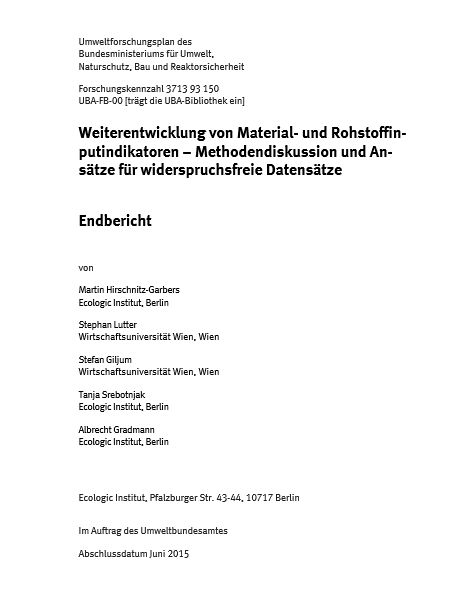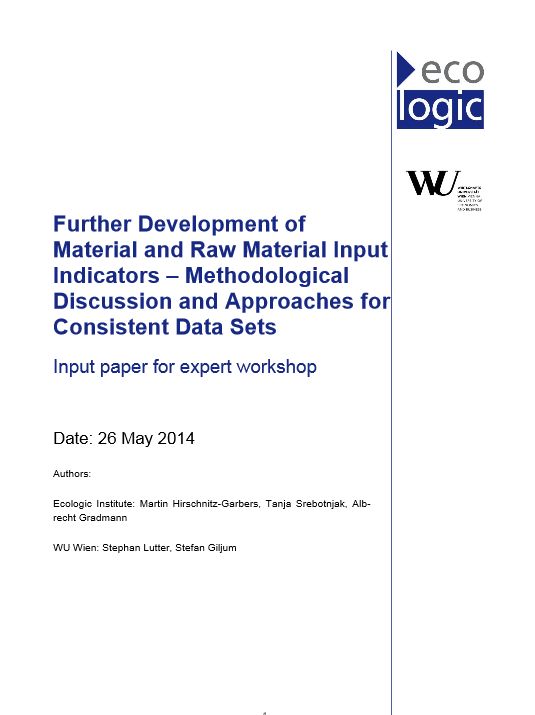Indicators are essential for measuring the performance of resource policy and communication of goal achievement. The underlying purpose of the project "Further Development of Raw Material Input Indicators – Methodological Discussion and Approaches for Consistent Datasets" is to analyze the existing indicators with their underlying methodologies, as well as the need for their further development, and to develop proposals for their harmonization. The Ecologic Institute coordinates the project, conducts expert interviews and workshops and develops a concept for methodological harmonisation.
Background
Successful implementation of resource policy requires consistent and meaningful indicators. Both the "Roadmap to a Resource Efficient Europe," published in September 2011 by the European Commission, and the German Resource Efficiency Programme (ProgRess) from February 2012 call for such indicators. Furthermore, comprehensive and robust indicators of resource usage are equally important in the context of international discussions regarding a "Green Economy" as a new path for development.
Although the development of meaningful indicators of resource use has made considerable progress, particularly in the last few years, existing indicators and the approaches and methods used for their calculation are partially inconsistent and contradictory. Hence, there is still more need for improvement in order to reduce distortions in the measurement of resource use and the related potential for making incorrect political and macroeconomic decisions.
Project objectives
The over-arching goal of this project is to support the German Federal Government in the further development of indicators of raw material usage and resource efficiency. This goal must be understood in relation to the Roadmap to a Resource Efficient Europe and ProgRess. Both of these initiatives aim to increase resource efficiency in production and consumption. Indicators are essential for performance measurement and communication of goal achievement. The goals of this research project are:
- The facilitation of methodological harmonization through greater exchange between researchers and official statistics offices.
- The investigation of existing indicators and their underlying methodologies for their need for further development.
- The harmonization of available datasets and through it the reduction of existing data-related inconsistencies between the individual raw material input metrics.
Approach
In order to achieve the previously stated goals, the following procedures will be implemented:
- Treatment of the current discussion of material input indicators and underlying methodological approaches, as well as the development of an overview of existing data sources.
- Identification of methodological questions and incompatibilities between indicators, as well as existing gaps in the data, for example insufficient ability to link existing data sources.
- Development of concrete suggestions for approaches to further methodological development and harmonization of existing datasets. To this end, three workshops will be held with experts from official statistics offices, as well as research, policy, and civil society organizations.
- Development of a concept for the further organization of scientific exchange and for the implementation of the developed approaches.
Work packages
Work Package 1: Background Research, Treatment of the Current Discussion
Overview of the scientific discussion of various approaches, methodological similarities and differences; Evaluation of the availability and quality of the necessary data.
Work Package 2: Scientific Exchange and Discussion Process for the Further Development of the Indicators. Workshops to survey the reasons for varying levels of acceptance between the different indicators, formulation of methodological approaches for the further development of the indicators and discussion of the harmonization of the datasets.
Work Package 3: Concept for the Implementation of a Further Developed Methodology
Appraisal of the approaches to harmonizing the data requirements and the necessary conditions for their implementation. Creation of a concept for the further design of the communication process and the implementation of the approaches.





